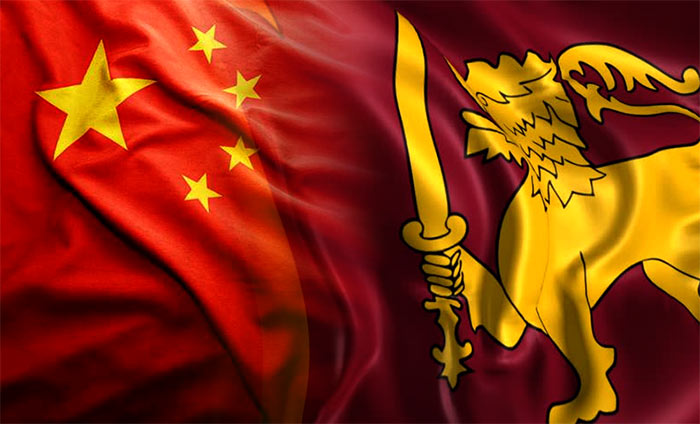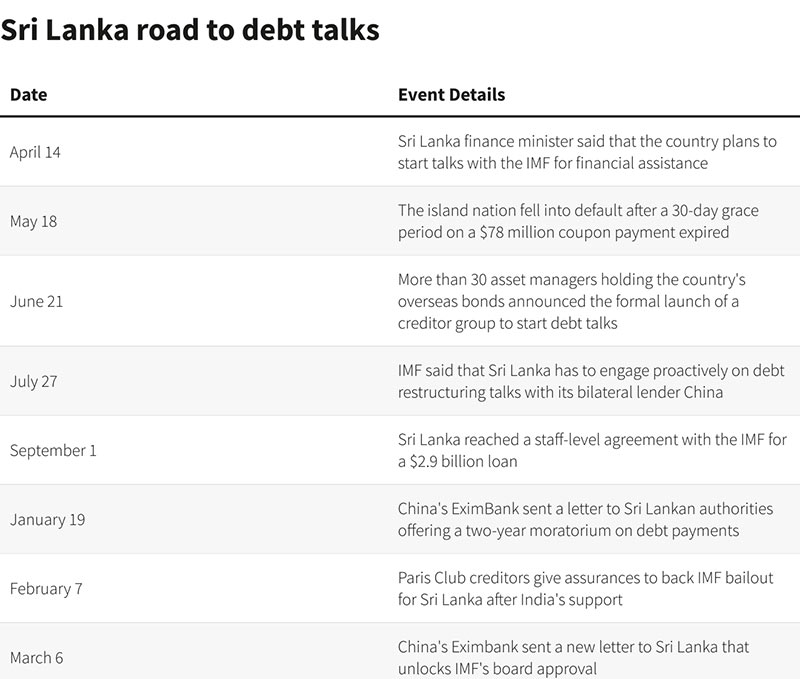Analysis: China paves Sri Lanka’s way to IMF funds, but debt talks remain uncertain

China’s pledge to support Sri Lanka’s debt reorganization, a major step for the island nation in securing an IMF lifeline, provides little clarity on how negotiations will unfold or whether this could herald progress for other heavily indebted nations.
Analysts remain cautious on how significant China’s new commitment will be for the country, whose 22 million people urgently need funds from the $2.9 billion International Monetary Fund programme amid shortages of food, fuel and medicines.
Cash-strapped nations such as Zambia and Ghana are also facing talks on reworking debt with Chinese lenders, and Sri Lanka’s negotiations showed that international efforts to standardize some debt rework parameters are failing. China is the biggest bilateral creditor to Sri Lanka, which defaulted on its international debt last year.
The Export-Import Bank of China (EXIM) told Sri Lanka in a letter that it will try to expedite debt talks in the months ahead, in addition to a two-year moratorium secured previously.
The bank also clarified that financial negotiations should remain “between our two sides.”
“It is hard to see whether this is a change in Chinese (or Indian, for that matter) policy towards sovereign restructuring deals going forward or a one-off for this case. My guess: the latter,” said Mitu Gulati, a law professor at Duke University in the U.S.
While Sri Lanka is not part of the Group of 20’s Common Framework debt platform due to its middle-income status, this approach could jeopardize bilateral creditors’ efforts to restructure debt in comparable terms. The Paris Club of creditor nations and India have previously provided financing assurances.
Sri Lanka owed China’s EXIM $4.1 billion, or 11% of the country’s foreign currency debt, at the end of 2022, according to government data.
BOARD APPROVAL VS DEBT DEAL
An executive board approval unlocks IMF financing, though it doesn’t necessarily mean it will expedite debt talks.
“The next step for Sri Lanka will be to turn these financing assurances into a concrete restructuring deal, ideally before the first or second program review, which is something that has proven difficult so far in other country cases,” said Theo Maret, senior research analyst at Global Sovereign Advisory, in Paris.
Zambia’s debt rework is far from over after board approval for a $1.3 billion programme in September, as both bilateral and commercial creditors challenge the IMF’s debt sustainability analysis, a document addressing the debt relief the country needs. The country’s Finance Minister Situmbeko Musokotwane said that progress has been slow, and the outcome is uncertain.
Once the executive board approval is secured, the IMF will publish Sri Lanka’s debt sustainability analysis.
“All eyes will be on the conditionalities imposed under the programme, particularly on the debt restructuring that’s required,” JPMorgan analysts wrote in a note.
Sri Lanka “is significant as an example that not every case is turning into a Zambia-style stalemate but I’d still be cautious in general,” said Sergi Lanau, deputy chief economist at the Institute of International Finance.
“It looks like negotiations will continue to be case by case, without much success at beefing up the common framework to the point that it is a set procedure the next few cases follow,” Lanau added.
(Reuters)

Latest Headlines in Sri Lanka
- CID raids Kataragama Basnayake Nilame’s house in search of IGP Deshabandu March 10, 2025
- Sri Lanka’s remittance inflows continue to grow in February 2025 March 10, 2025
- IGP Deshabandu Tennakoon seeks court order to block arrest March 10, 2025
- Chamal Rajapaksa to contest Local Government Elections under SLPP March 10, 2025
- Aloe Blacc arrives in Sri Lanka to explore investment opportunities March 10, 2025



